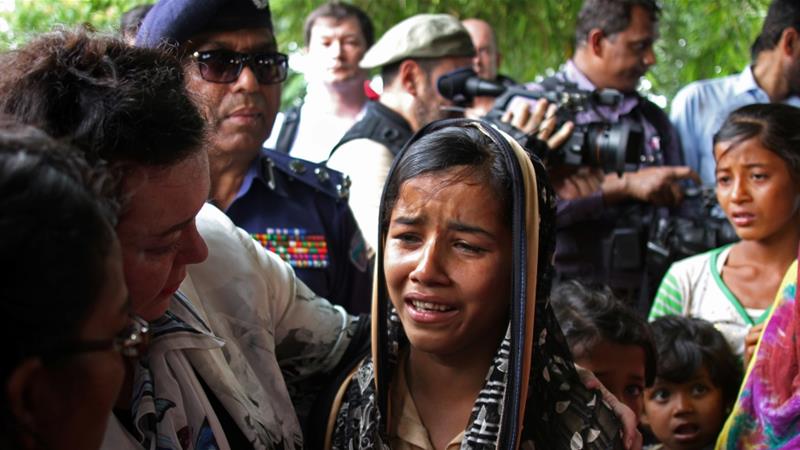The Rohingya’s Hope for Justice Lies with the ICC
ASIA-UPDATES ON MYANMAR ROHINGYA GENOCIDE, 28 May 2018
The UN Security Council must refer the Rohingya’s case to the International Criminal Court.

British United Nations Ambassador Karen Pierce consoles a twelve-year-old Rohingya refugee near Cox’s Bazar, in Bangladesh on April 29, 2018. [Reuters/Michelle Nichols]
20 May 2018 – When I visited Bangladesh a few weeks ago, I heard heart-wrenching stories from some of the hundreds of thousands of Rohingya people who have fled atrocities in Myanmar. I met women who had been raped by soldiers, children who had seen their parents shot dead before their very eyes, and families who had lost everything. But if there was one thing that united almost all survivors, it was the desire for justice.
As a Rohingya myself, I can relate to this all too well. I felt compelled to flee Rakhine state in the late 1990s because of the dehumanising restrictions I faced. I was not allowed to go to university simply because I was a Rohingya, for example. I have since been able to settle in London, and I am very aware that I am one of the “lucky” ones.
Many of my friends and relatives have suffered horrific violence in recent years. Some saw their homes burned down by mob attacks on Rohingya people in 2012, and have lived in squalid conditions in displacement camps in Myanmar ever since. Others have become victims of more recent military campaigns in 2016 and 2017: they have been killed, raped and driven from their homes. I have watched this systemic attempt by Myanmar to destroy our community for two decades now.
The current escalation of the crisis dates back to August 2017, when attacks by the armed group Arakan Rohingya Salvation Army triggered a vicious and disproportionate response by the Myanmar military.
Almost 700,000 people were forced to flee across the border into Bangladesh as security forces and their proxies went on a rampage across Rakhine State. Thousands were killed while hundreds of villages were torched and burned to the ground. The UN human rights chief, Zeid Ra’ad al-Hussein, has said he suspects that “acts of genocide” were committed against the Rohingya.
This latest bout of violence is by far not the first. In the late 1970s and the early 1990s, similar devastating campaigns by the Myanmar military drove hundreds of thousands of Rohingya out of Rakhine State. For the Rohingya people, history keeps repeating itself in the worst possible way.
WATCH: Undercover for RVision: Reporting Myanmar’s Rohingya story
Yet time and again, we have seen how perpetrators of human rights abuses have escaped without punishment, free to commit the same crimes over and over. There is no question that we need international support more than ever to ensure that justice is delivered to the Rohingya.
Accountability is crucial to breaking this vicious cycle of abuse. If those responsible for human rights violations against the Rohingya are brought to justice, it would send a powerful signal that these atrocities will not be tolerated.
Myanmar, however, has proven itself both unwilling and unable to investigate crimes against the Rohingya. Domestic inquiries have been little more than window dressing for the international community. Myanmar’s authorities have, by and large, even flat out denied that atrocities are taking place.
The military, headed by Senior General Min Aung Hlaing, has little incentive to investigate their own crimes. The civilian government, led by the former democracy icon Aung San Suu Kyi, cannot be relied upon either.
The Myanmar leader and former dissident has dismissed reports of human rights violations and has said that what is going on is not ethnic cleansing.
She has failed in both her moral and political responsibility to do what she can to end the violence. There are still sections of the international community that cling on to the hope that Aung San Suu Kyi will come good, but at this stage it is abundantly clear that such hopes are misplaced.
If anything, Myanmar has taken active steps to block international scrutiny. The authorities have denied access to the United Nations Fact-Finding Mission, created by the Human Rights Council (HRC) to “establish the facts and circumstances” of alleged security force violations.
The only hope for justice lies with the international community. In late April, a delegation from the UN Security Council spoke to traumatised Rohingya in Bangladeshi refugee camps and visited torched villages inside Myanmar. The UNSC must now act on this visit and refer Myanmar to the International Criminal Court (ICC).
Myanmar is not a party to the ICC and has not accepted the court’s jurisdiction. This means that only the Security Council can refer the situation to the Court.
Earlier in April, ICC prosecutor Fatou Bensouda asked the court to rule on whether the ICC “can exercise jurisdiction over the alleged deportation of the Rohingya people from Myanmar to Bangladesh,” which is under the jurisdiction of the ICC. While this was a welcome move, an ICC ruling on the crime of deportation would not include other crimes against humanity, including murder, rape, torture, persecution or genocide.
Mere statements from the UNSC urging Myanmar to investigate abuses will accomplish nothing, no matter how strongly worded they are. It is abundantly clear that any investigation must be genuinely independent and internationally led. The ICC is the institution by far best placed to do this.
This complete lack of accountability is not just affecting the Rohingya, but also people in other ethnic areas where security forces and armed groups commit war crimes with impunity. In Kachin State, for example, thousands of people were forced to flee their homes a few weeks ago when violence flared between the military and insurgents.
The refugees I met in Bangladesh live in squalid shelters with inadequate access to food, water and sanitation. The upcoming monsoon season is threatening to make their lives even worse. Many of them are deeply traumatised from what they witnessed in Myanmar.
I was deeply moved that despite all they have been through, so many people still wanted to see justice done more than anything else. The Security Council has an opportunity now to make this reality, it is one that cannot be missed.
_________________________________________________
 Tun Khin is President of Burmese Rohingya Organisation UK.
Tun Khin is President of Burmese Rohingya Organisation UK.
Go to Original – aljazeera.com
DISCLAIMER: The statements, views and opinions expressed in pieces republished here are solely those of the authors and do not necessarily represent those of TMS. In accordance with title 17 U.S.C. section 107, this material is distributed without profit to those who have expressed a prior interest in receiving the included information for research and educational purposes. TMS has no affiliation whatsoever with the originator of this article nor is TMS endorsed or sponsored by the originator. “GO TO ORIGINAL” links are provided as a convenience to our readers and allow for verification of authenticity. However, as originating pages are often updated by their originating host sites, the versions posted may not match the versions our readers view when clicking the “GO TO ORIGINAL” links. This site contains copyrighted material the use of which has not always been specifically authorized by the copyright owner. We are making such material available in our efforts to advance understanding of environmental, political, human rights, economic, democracy, scientific, and social justice issues, etc. We believe this constitutes a ‘fair use’ of any such copyrighted material as provided for in section 107 of the US Copyright Law. In accordance with Title 17 U.S.C. Section 107, the material on this site is distributed without profit to those who have expressed a prior interest in receiving the included information for research and educational purposes. For more information go to: http://www.law.cornell.edu/uscode/17/107.shtml. If you wish to use copyrighted material from this site for purposes of your own that go beyond ‘fair use’, you must obtain permission from the copyright owner.
Read more
Click here to go to the current weekly digest or pick another article:
ASIA-UPDATES ON MYANMAR ROHINGYA GENOCIDE: